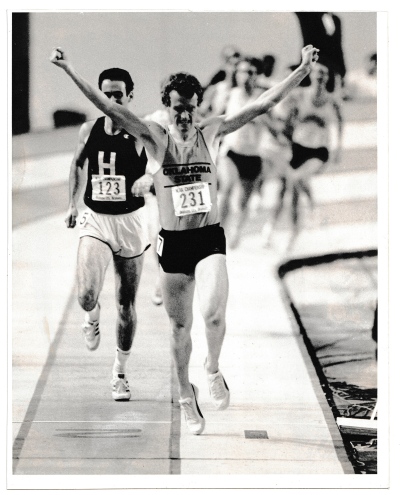Journalist and former athlete Paul Larkins reflects on a golden era of British middle-distance running and its resurgence over the past few years in his new book Running in the Shadows of the Gods.
By Paul Larkins
There can be no doubt England’s athletes are currently enjoying a real peak in athletics. And not just the incredible performances fans and athletes are experiencing on a weekly basis. There are more races than ever before, not to mention the incredible technology to help you to better performances.
I know that, as I’ve been involved with the sport for the best part of 50 years both as a runner and a journalist – currently a content creator for England Athletics. For the past decade I’ve reported on all of the national championships, seen some sensational performances and as I said, as a sports journalist been lucky enough to have an industry insight into the running shoe market. And as we all know, carbon shoes and the undoubted additional power and speed they provide is the subject of many a club run argument!
That’s partly the reason I wrote Running in the Shadows of the Gods. It is a tale about me, a fairly regular runner at the start of the 1980s chasing a dream – to run against Steve Ovett and Seb Coe, real Gods of that era. If you need reminding, they broke the world record for all the middle distances and between them secured three Olympic gold medals. Everybody wanted to be Coe or Ovett. Even the BBC News was delayed so fans could watch their world record attempts live. They were that important!
For me, actually competing against them meant improving – a lot – on my 171st in the National Cross-country. It took a few years and you may have to dig deep to find my performances but hidden amongst those Coe, Ovett and Steve Cram epics I did manage to win the NCAA Mile and run 3:35 for 1500 metres. If nothing else, it should tell you: chase your dreams; you never know where it’ll take you.

Image courtesy of Paul Larkin.
That’s part of the story, but as I wrote Running in the Shadows of the Gods, I realised everything we enjoy as England Athletics competitors owes something to that era. Running shoes developed beyond all recognition, events like the Great North Run and the London Marathon were created and even something as simple as the socks you wear to compete in developed at breakneck speed.
To get ready for the English Schools my teammate, Steve Heard (the then English Schools record holder for 400, 47.1) and I both trained on a bumpy grass track. Visits to the cinder track were the highlight of our month let alone an all-weather surface. By the end of that decade grass and cinder had all but gone and today that’s the stuff of movies like Chariots of Fire. Honestly though, I’m not that old!
I went to America on an athletics scholarship and things weren’t that more advanced. We raced on wooden tracks indoors – as in wood with no covering or on occasion flat tracks made of something like Lino I guess.
Running in the Shadows of the Gods talks about all of this and more. It’s about the surprising influence one decade has had on today’s athletics. Yes, it’s about me as well, but I like to say that should tell you anything is possible. Ok, I wasn’t a world record holder, but I did win three national titles and an NCAA gold. At the time, I didn’t realise just how significant that was until I was invited to host a table at a fancy dinner in Tulsa, Oklahoma where people paid top dollar to sit next to champions. Mind you, I think they were a bit disappointed with me as on the table next to me was Barry Sanders – one of the greatest NFL footballers… ever. Shadows of the Gods are everywhere.
And as I started this piece: truly our sport is enjoying a well-deserved repeat of that era. Back in 2019, working for England Athletics at the age group championships, I see I wrote: ‘The men’s U20 800m was definitely all about that current strength in depth. No one questioned that Max Burgin would surge to the front given his recent form; what the crowd wasn’t ready for was the stunning time he clocked. He powered through 400 in 52.02 and then stretched away in the final 150 for a simply amazing 1:45.36, the British record for U20s and far quicker than the 1:47.29 championships best performance. It was also the fastest by a Brit this year.’
At the same championships, a year earlier, I see my report includes this description of the 800 metres: ‘Max Burgin was in a similar mood – ready to lay down the challenge from the gun. He flew through 400 in 53.4 and continued to stretch away on the back straight. A slight stumble with 200m to go did little to slow him down and the age group record holder was rewarded with a CBP of 1:50.26. No less impressive was Keely Hodgkinson who whipped around the second lap in 62 seconds for a 2:06.85 win, a PB by more than a second (in a tactical race) and the suggestion there’s way more in the tank.’
*Running in the Shadows of the Gods is available right now on Amazon or to order from your favourite bookstore for £10.99. Better, given England Athletics’ commitment to sustainability, it’s also available as an e-book on Kindle for £3.99.